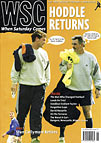 Shrewdness is the key to success
Shrewdness is the key to success
Bear with us, this month’s issue isn’t entirely about Tottenham. But the current state of the club does raise some intriguing questions about where English football has come from and where it’s going to. When WSC started in 1986, the three men in charge at White Hart Lane were Irving Scholar (chairman), David Pleat (manager) and Glenn Hoddle (lead artiste). Strange, then, to see them all together again, even if it was at Highbury in an atmosphere that was both sombre because of David Rocastle’s death and frosty because of the long-standing differences between Pleat and Hoddle.
According to the BBC’s recent documentary The Men Who Changed Football, reviewed elsewhere in this issue, Scholar was one of those responsible for dragging the game into the promised land. The fact that his former club have slipped from their position as one of the so-called “Big Five” to somewhere more like the “Middle Eight” since he left them with a whopping pile of debt ten years ago suggests his touch was less than golden. So, indeed, does the state of the other club he was involved in more recently, Nottingham Forest.
They announced at the start of April that £3.1 million had been lost in the previous six months and that severe economies would need to be made if the team failed to reach the Premiership this season. That can’t be directly or solely blamed on Scholar, of course, although as we go to press Forest fans were awaiting the outcome of a long drawn-out court case brought by Scholar and his fellow former director Julian Markham which does have a huge bearing on the club’s future viability (for the background and outcome see www.theeye.com/chancerytales.htm).
One of Scholar’s visionary brainwaves back in the Eighties was to make Tottenham the first club to float on the stock market. After a bumpy decade, this option came heavily back into fashion in the mid-Nineties, when the Sky money and the Champions League cashcow seemed to make the very top clubs at least unbeatable investments. Sadly, the past year has seen slumping share values for virtually all the listed football clubs, including Manchester United. At least one club chairman, Aston Villa’s Doug Ellis, has said he would like to reverse the process and make the club a private company again, if only his by now out-of-pocket shareholders would agree.
Scholar’s other big idea was merchandising. This proved more of a winner, although Tottenham’s own operation ran into the sand before the end of the 1980s. Yet now that too seems to have peaked in its ability to raise ever-increasing funds for canny clubs.
We could list other “visionary” ideas that have failed even more spectacularly to come to fruition: Sir John Hall’s multi-sports Geordie empire, for example, whose tie-up with the local rugby club has proved a path to financial ruin for others too (QPR to name but one). Or what about diversification as practised by Chelsea, where the income from associated hotels and other businesses was supposed to support the football team, but so far seems to have had the opposite effect, if anything.
The point is not to demonise the people who run football clubs. Some of them have made money out of football and some have lost it. But if there is a message from the tortuous journey of Scholar and Tottenham in particular, it is surely to beware of visionaries. People who get involved at the top level of football clubs, whether affecting lack of interest in the game, like Scholar’s successor Alan Sugar, or desperate passion for it, like Crystal Palace’s saviour-in-reverse Mark Goldberg, are not renowned for their judgment. They believe that building one business successfully means they can repeat the trick at a football club but, thankfully, it so often proves not to be the case.
The so-called Men Who Changed Football were, to put it bluntly, opportunists, who got lucky when satellite television came along. Their successors are similarly tossed every which way by the wild swings in football’s finances. Those who run a tight ship and batten down the hatches are more likely to survive than the buccaneers. If ever football fans needed a slogan to live by it should surely be: Don’t believe the hype.
From WSC 171 May 2001. What was happening this month